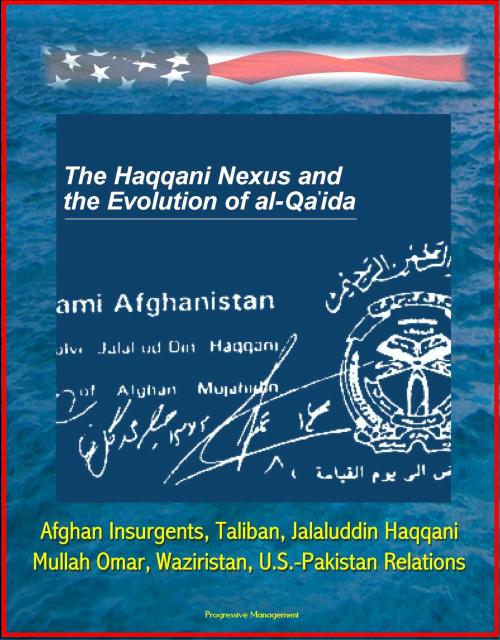The Haqqani Nexus and the Evolution of al-Qa'ida: Afghan Insurgents, Taliban, Jalaluddin Haqqani, Mullah Omar, Waziristan, U.S.-Pakistan Relations
Nonfiction, Social & Cultural Studies, Political Science| Author: | Progressive Management | ISBN: | 9781301404315 |
| Publisher: | Progressive Management | Publication: | February 15, 2013 |
| Imprint: | Smashwords Edition | Language: | English |
| Author: | Progressive Management |
| ISBN: | 9781301404315 |
| Publisher: | Progressive Management |
| Publication: | February 15, 2013 |
| Imprint: | Smashwords Edition |
| Language: | English |
The targeted killing of Usama bin Ladin at a compound in the garrison city of Abbottabad, Pakistan has raised a number of important questions about the infamous global jihadist's local connections. It has also highlighted how little is really known about the patrons and supporters that enabled al-Qa'ida's charismatic leader to hide in plain sight, and communicate with his key lieutenants, for so many years. Al-Qa'ida's successful integration into the complex local landscape of Islamist militancy in the Afghanistan-Pakistan region is not a recent phenomenon, and since the 1980s Bin Ladin's organization has been dependent on a network of local supporters to conduct an increasingly global campaign of violence. Indeed, the inception, execution and continuity of al-Qa'ida's global jihad cannot be meaningfully separated from this local dimension, which today remains one of the least studied aspects of the organization's history. The present report aims to address this gap through an analysis of the history and organizational relationships of the Haqqani network, a single major constant that, for the entirety of al-Qa'ida's existence, has shaped the latter's local trajectory in the region.
A great deal of attention has been given to the activities of the Haqqani network in recent years, with the group having been described as the pivot issue between Pakistan and the United States. The Haqqani network, as it is commonly called, is an Afghan and Pakistani insurgent group that has its roots in the 1970s. The identity and evolution of the group is intimately tied to its patriarch and historic leader, Jalaluddin Haqqani. Over three decades of conflict the group has played a unique role in the region due to its interpersonal relations, geographic position and strategic approach. Today, the Haqqani network operates as a semi-autonomous component of the Taliban with primacy in southeastern Afghanistan. Part of the network's power also stems from its close ties to Pakistan's Army and intelligence agencies, which have historically used the group as a proxy to exert influence in Afghanistan and to mediate disputes in Pakistan's Federally Administered Tribal Areas (FATA). Throughout its history the Haqqani network has operated on and influenced militancy on the local, regional and global levels, the most underappreciated dimension of which is the global character of the Haqqani network and the central role it has played in the evolution of al-Qa'ida and the global jihadi movement. This is a gap of strategic proportions, insofar as the Haqqani network has been more important to the development and sustainment of al-Qa'ida and the global jihad than any other single actor or group.
Three main factors explain why a more developed understanding of the Haqqani network's broad role in this history has remained elusive. First, although recognized as a distinct organization (i.e. a tanzim) by foreign jihadists as early as 1994, the historical evolution of the Haqqani network has received limited attention. Almost all historical treatments of the group are tangential in nature and rely heavily on secondary sources. Few studies offer unique or granular insights about the evolution of the Haqqani network, the pre-2001 actions of the group and its long-standing ties with key actors.
The targeted killing of Usama bin Ladin at a compound in the garrison city of Abbottabad, Pakistan has raised a number of important questions about the infamous global jihadist's local connections. It has also highlighted how little is really known about the patrons and supporters that enabled al-Qa'ida's charismatic leader to hide in plain sight, and communicate with his key lieutenants, for so many years. Al-Qa'ida's successful integration into the complex local landscape of Islamist militancy in the Afghanistan-Pakistan region is not a recent phenomenon, and since the 1980s Bin Ladin's organization has been dependent on a network of local supporters to conduct an increasingly global campaign of violence. Indeed, the inception, execution and continuity of al-Qa'ida's global jihad cannot be meaningfully separated from this local dimension, which today remains one of the least studied aspects of the organization's history. The present report aims to address this gap through an analysis of the history and organizational relationships of the Haqqani network, a single major constant that, for the entirety of al-Qa'ida's existence, has shaped the latter's local trajectory in the region.
A great deal of attention has been given to the activities of the Haqqani network in recent years, with the group having been described as the pivot issue between Pakistan and the United States. The Haqqani network, as it is commonly called, is an Afghan and Pakistani insurgent group that has its roots in the 1970s. The identity and evolution of the group is intimately tied to its patriarch and historic leader, Jalaluddin Haqqani. Over three decades of conflict the group has played a unique role in the region due to its interpersonal relations, geographic position and strategic approach. Today, the Haqqani network operates as a semi-autonomous component of the Taliban with primacy in southeastern Afghanistan. Part of the network's power also stems from its close ties to Pakistan's Army and intelligence agencies, which have historically used the group as a proxy to exert influence in Afghanistan and to mediate disputes in Pakistan's Federally Administered Tribal Areas (FATA). Throughout its history the Haqqani network has operated on and influenced militancy on the local, regional and global levels, the most underappreciated dimension of which is the global character of the Haqqani network and the central role it has played in the evolution of al-Qa'ida and the global jihadi movement. This is a gap of strategic proportions, insofar as the Haqqani network has been more important to the development and sustainment of al-Qa'ida and the global jihad than any other single actor or group.
Three main factors explain why a more developed understanding of the Haqqani network's broad role in this history has remained elusive. First, although recognized as a distinct organization (i.e. a tanzim) by foreign jihadists as early as 1994, the historical evolution of the Haqqani network has received limited attention. Almost all historical treatments of the group are tangential in nature and rely heavily on secondary sources. Few studies offer unique or granular insights about the evolution of the Haqqani network, the pre-2001 actions of the group and its long-standing ties with key actors.















